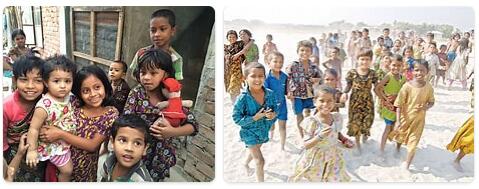Yearbook 2016
Bangladesh. The contradictions between the Awami government and the largest opposition party Bangladesh Nationalist Party (GDP) continued to cast a shadow over political life.
GDP, which boycotted the 2014 parliamentary elections, ran in local elections in preparation for the next parliamentary elections. At least 120 people were killed during the local elections, which were held in six rounds. Some violence was attributed to settlements between rival factions within the Awami League.
The current population of Bangladesh is 164,689,394. A series of acts of violence and murders of secular bloggers, religious minorities, including Hindu priests, and LGBT activists were reported. Since 2013, these attacks are believed to have required at least 50 fatalities. Two students were given the death penalty in January for the 2013 murder of a secular blogger.

The June murder of the wife of a senior police officer who investigated then-attributed banned Jamaat-ul-Mujahideen helped trigger an extensive arrest wave. At least 13,000 people were arrested. The raids were allegedly directed against suspected jihadists as well as members of the Islamist party Jamaat-e-Islami. The BNP claimed that the aim was to silence the opposition. Human rights groups have criticized the police for abusing prisoners and demanding bribes to release those arrested.
Legal proceedings against the opposition are one of the government’s methods of silencing critics. The government was also criticized for pushing through a law that restricts the ability of individual organizations to receive foreign aid.
Several charges were brought during the year against GDP leader Khaleda Zia for, among other things, corruption and upheaval in connection with violent protests in 2015. She and her eldest son, Tarique Rahman, were re-elected as BNP’s highest leader in March. The son was sentenced in July to seven years in prison for bribery and money laundering, but has appealed. A bloody hostage drama in July at a cafe in a prosperous part of the capital Dhaka created headlines and concerns. Of the 27 dead, 20 were hostages, most of them foreigners. The Islamic State (IS) took on the act. But the government claimed that domestic Jamaat-ul-Mujahideen was behind. Prime Minister Shejk Hasina promised to answer those responsible and Khaleda Zia condemned the act. Security forces killed several suspects at various attacks, including the man who allegedly planned the attack.
Growth was just over 7% during the year and the country sought to attract investments from China, Japan, the Russian Federation and neighboring India, among others. In October, Chinese President Xi Jinping conducted the first Chinese state visit in 30 years and signed a series of cooperation and loan agreements.
World Bank Governor Jim Yong Kim, during a visit, highlighted progress made in poverty alleviation. Investments in education, roads and getting women out of the labor market were a few factors. But more was required. The World Bank granted $ 2 billion in loans for climate adaptation.
A fire in a packaging plant that claimed 33 deaths in September again put the searchlight on deficiencies in work environment and safety.
In March, Atiur Rahman, as head of the central bank after the disclosure in February, resigned over $ 101 million from a currency account held by the central bank in the New York Federal Reserve. While $ 21 million could be tracked and blocked in Sri Lanka, $ 80 million remained in the Philippines.
During the year, two death sentences were handed down by the criticized National Criminal Tribunal, the International Crimes Tribunal (ICT), for crimes committed during the Liberation War of 1971. Motiur Rahman Nizami, leader of the Jamaat-e-Islami party, was hanged in May. In September, one of the party’s main financiers, Mir Quasem Ali, was executed. Other defendants received life sentences. The government rejected criticism from Pakistan and Turkey. Human rights groups have also pointed to shortcomings in the process.
According to thereligionfaqs, Bangladesh was also criticized for not allowing refugees from neighboring Burma’s Muslim minority, Rohingya, who were on the run after escalating violence at the end of the year.